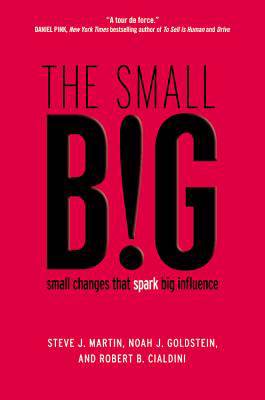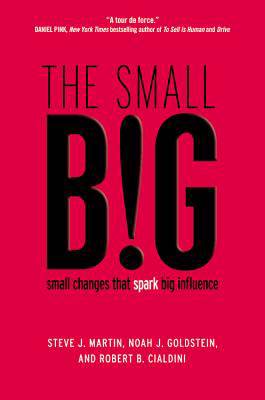
- Afhalen na 1 uur in een winkel met voorraad
- Gratis thuislevering in België vanaf € 30
- Ruim aanbod met 7 miljoen producten
- Afhalen na 1 uur in een winkel met voorraad
- Gratis thuislevering in België vanaf € 30
- Ruim aanbod met 7 miljoen producten
Zoeken
The Small Big
Small Changes That Spark Big Influence
Steve J Martin, Noah Goldstein, Robert Cialdini
Hardcover | Engels
€ 54,95
+ 109 punten
Omschrijving
At some point today you will have to influence or persuade someone - your boss, a co-worker, a customer, client, spouse, your kids, or even your friends. What is the smallest change you can make to your request, proposal or situation that will lead to the biggest difference in the outcome?
In The small BIG, three heavyweights from the world of persuasion science and practice -- Steve Martin, Noah Goldstein and Robert Cialdini -- describe how, in today's information overloaded and stimulation saturated world, increasingly it is the small changes that you make that lead to the biggest differences.
In the last few years more and more research - from fields such as neuroscience, cognitive psychology, social psychology, and behavioral economics - has helped to uncover an even greater understanding of how influence, persuasion and behavior change happens. Increasingly we are learning that it is not information per se that leads people to make decisions, but the context in which that information is presented.
Drawing from extensive research in the new science of persuasion, the authors present lots of small changes (over 50 in fact) that can bring about momentous shifts in results. It turns out that anyone can significantly increase his or her ability to influence and persuade others, not by informing or educating people into change but instead by simply making small shifts in approach that link to deeply felt human motivations.
In The small BIG, three heavyweights from the world of persuasion science and practice -- Steve Martin, Noah Goldstein and Robert Cialdini -- describe how, in today's information overloaded and stimulation saturated world, increasingly it is the small changes that you make that lead to the biggest differences.
In the last few years more and more research - from fields such as neuroscience, cognitive psychology, social psychology, and behavioral economics - has helped to uncover an even greater understanding of how influence, persuasion and behavior change happens. Increasingly we are learning that it is not information per se that leads people to make decisions, but the context in which that information is presented.
Drawing from extensive research in the new science of persuasion, the authors present lots of small changes (over 50 in fact) that can bring about momentous shifts in results. It turns out that anyone can significantly increase his or her ability to influence and persuade others, not by informing or educating people into change but instead by simply making small shifts in approach that link to deeply felt human motivations.
Specificaties
Betrokkenen
- Auteur(s):
- Uitgeverij:
Inhoud
- Aantal bladzijden:
- 288
- Taal:
- Engels
Eigenschappen
- Productcode (EAN):
- 9781455584253
- Verschijningsdatum:
- 9/09/2014
- Uitvoering:
- Hardcover
- Formaat:
- Genaaid
- Afmetingen:
- 163 mm x 231 mm
- Gewicht:
- 476 g

Alleen bij Standaard Boekhandel
+ 109 punten op je klantenkaart van Standaard Boekhandel
Beoordelingen
We publiceren alleen reviews die voldoen aan de voorwaarden voor reviews. Bekijk onze voorwaarden voor reviews.











